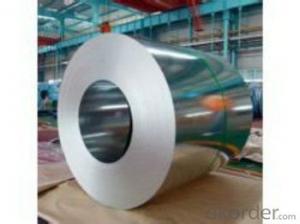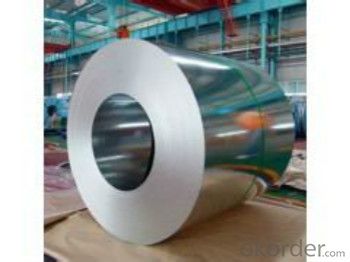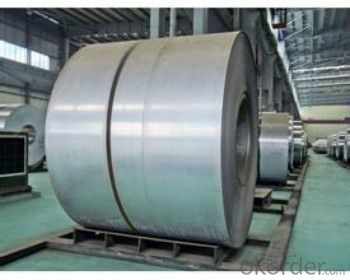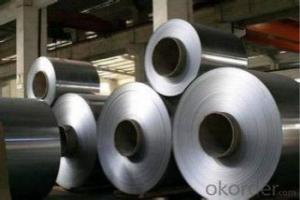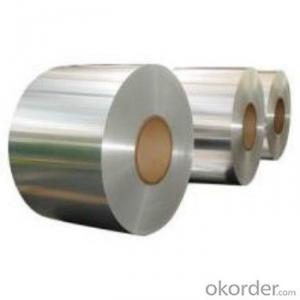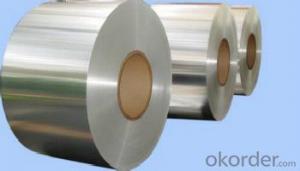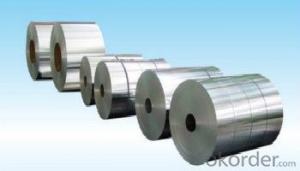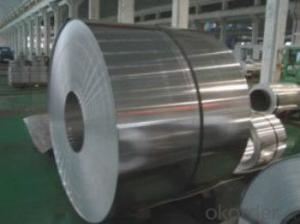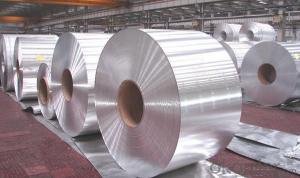Aluminum Coil for Gutter Machine - Mill Finished Aluminium Coil AA3105 Temper H14
- Loading Port:
- Shanghai
- Payment Terms:
- TT OR LC
- Min Order Qty:
- 5 m.t.
- Supply Capability:
- 4000 m.t./month
OKorder Service Pledge
OKorder Financial Service
You Might Also Like
Specification
1. Aluminum Coil Description:
Aluminum coil, is a rolled product, produced in a coiled form of continuous strip, and having an ID (Inner diameter) and OD (Outer diameter).Common alloy coil are used for a wide variety of applications, alloy 1050, 1060, 3003, 3105, 3005, 5052, 5754, 5083, 6061, 8011, 8021, and so on, in thickness from 0.0065-7mm, in width from 300- 2200mm.
Aluminium coil can be deep processed into aluminium foilstock, aluminium circle, aluminium coating products, aluminium ceiling, aluminium plastic composite panel (APCP), aluminium embossed products, etc.
2.Main Features of the Aluminum Coil:
• Great ductility
• Heat conductivity
• Anti-corrosion
• Moisture resistanve
3.Aluminum Coil Images
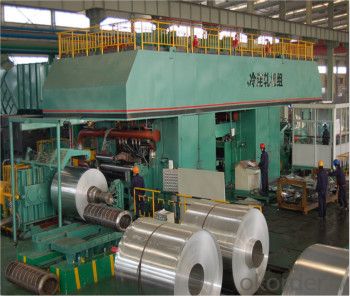
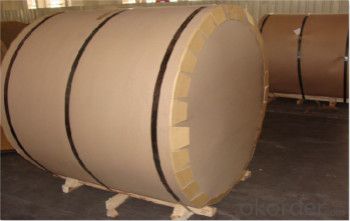
4.Aluminum Coil Specification
Aluminum Coil/Sheet | |
Main Specification | |
Alloy | AA1xxx (AA1050, AA1060, AA1070, AA1100 etc.) |
AA3xxx (AA3003, AA3004, AA3005, AA3105 etc.) | |
AA5xxx, AA6XXX (AA5052,AA5083, AA5754, AA6061, AA6062 etc.) | |
AA8xxx(AA8011, AA8006, AA8079 etc.) | |
Temper | H14,H16, H18, H22, H24, H26, H32,O/F |
Thickmess | ≥0.2mm |
Width | 30mm-2100mm |
Standard | GB/T 3880-2006 |
Special specification is available on customer's requirement | |
5.FAQ
We have organized several common questions for our clients,may help you sincerely:
(1) How to guarantee the quality of the products?
We have established the international advanced quality management system, every link from raw material to final product. we have strict quality test; we resolutely put an end to unqualified products flowing into the market. At the same time, we will provide necessary follow-up service assurance.
(2) MOQ?
For trail order, we accept 5 MT.
(3) Payment term?
30% deposit, balance against the BL copy; 100% L/C at sight
(4) What is the delivery time?
Depends on actual order, around 30 to 35 days
- Q: This question asks for methods to determine the age of an aluminum coil, distinguishing between new and old.
- <p>To determine if an aluminum coil is new or old, you can look for several indicators: the surface condition, such as scratches or signs of wear; the quality of the protective coating, if any, which may degrade over time; the manufacturing date or batch number, if available; and the overall appearance and shine. New coils typically have a smooth, shiny surface with no significant scratches or dents, and a consistent protective coating. Old coils may show signs of oxidation, discoloration, or other forms of degradation. Additionally, testing the coil's physical properties, such as tensile strength, can provide clues about its age, as these properties can degrade over time.</p>
- Q: Can aluminum coils be used for decorative purposes?
- Aluminum coils offer a multitude of possibilities when it comes to decoration. This versatile material can be easily molded and adjusted, making it ideal for a wide range of decorative uses. In industries like architecture, interior design, and automotive design, aluminum coils are frequently employed to create decorative trims, accents, and borders. To further enhance their visual appeal and match the desired aesthetic, these coils can be painted or coated with different finishes. Moreover, thanks to their lightweight nature and durability, aluminum coils are a popular choice for outdoor decorative purposes, such as garden ornaments, sculptures, and signage. Ultimately, incorporating aluminum coils into various projects provides a cost-effective and visually pleasing solution for adding decorative elements.
- Q: Are there any limitations on the width-to-thickness ratio of aluminum coils?
- Yes, there are limitations on the width-to-thickness ratio of aluminum coils. The width-to-thickness ratio is an important factor in determining the overall strength and performance of aluminum coils. If the ratio is too high, it can lead to issues such as buckling, warping, or even failure of the coil. The specific limitations on the width-to-thickness ratio depend on various factors such as the alloy composition, temper, and intended application of the aluminum coil. Different alloys and tempers have different mechanical properties and can handle different ratios. Additionally, the intended application of the coil, such as roofing, automotive, or packaging, may have specific requirements for the width-to-thickness ratio. Manufacturers typically provide guidelines and specifications for the acceptable width-to-thickness ratio based on their product offerings. These guidelines ensure that the coils are used within their intended capabilities and prevent any issues related to excessive width-to-thickness ratios. It is important for users and designers to consider these limitations and guidelines when selecting and utilizing aluminum coils. Failure to adhere to these limitations can result in compromised performance, increased risk of damage, and potential safety concerns. Therefore, it is crucial to consult the manufacturer's recommendations and industry standards to determine the appropriate width-to-thickness ratio for a given application.
- Q: Are aluminum coils resistant to mold and mildew?
- Yes, aluminum coils are generally resistant to mold and mildew. Aluminum is a non-porous material, which means it does not absorb moisture like other materials such as wood or fabric. This makes it less susceptible to mold and mildew growth. Additionally, aluminum coils are often coated with protective finishes that further enhance their resistance to mold and mildew. However, it is important to note that while aluminum coils are less prone to mold and mildew, they are not completely immune. If the coils are exposed to excessive moisture or humidity, mold and mildew can still develop. Regular cleaning and maintenance are therefore necessary to prevent any potential mold or mildew growth.
- Q: What is the typical thermal conductivity of aluminum coils?
- The typical thermal conductivity of aluminum coils is approximately 205-220 W/mK. Aluminum is known for its excellent thermal conductivity, making it a popular choice for heat transfer applications such as in HVAC systems, refrigeration, and heat exchangers. The high thermal conductivity of aluminum allows for efficient heat dissipation and transfer, ensuring optimal performance and energy efficiency in these systems.
- Q: What are the different elongation values of aluminum coils?
- The elongation values of aluminum coils can vary depending on the specific alloy and temper of the aluminum. Generally, aluminum coils have excellent elongation properties, which means they can be stretched or deformed without breaking. For example, the commonly used alloy 3003-H14 has an elongation value of around 20-30%. This means that the aluminum coil can stretch up to 20-30% of its original length before it breaks. On the other hand, high-strength alloys like 7075-T6 have lower elongation values of around 9-13%. These alloys are designed for applications where strength is crucial, but they sacrifice some elongation properties. It's important to note that elongation values can also be influenced by the processing and treatment of the aluminum coils. For instance, annealing or heat treatment can improve the elongation properties of certain alloys. In summary, the elongation values of aluminum coils can range from 9% to 30%, depending on the alloy, temper, and processing methods used.
- Q: How is an aluminum coil made?
- An aluminum coil is made through a process called continuous casting and rolling. First, pure molten aluminum is poured into a continuous casting machine, which creates a solidified strip of aluminum. This strip is then fed through a series of rolling mills, where it undergoes multiple passes to achieve the desired thickness and shape. The rolling process also helps in improving the mechanical properties of the aluminum coil. Finally, the coil is coiled up and is ready to be used for various applications such as in construction, automotive, or packaging industries.
- Q: Please tell me the model of antirust aluminium coil, it is better to have a detailed introduction. Thank you。 Shandong production of rust resistant aluminum coil manufacturers
- Suitable for pipeline insulation and other heat preservation projects, can be used in the outer packing, mechanical components, refrigerators, air conditioning, ventilation pipes and other humid environment.
- Q: What are the advantages of using pre-painted aluminum coils?
- The utilization of pre-painted aluminum coils presents several benefits. To begin with, they provide a wide array of colors and finishes, allowing for greater design flexibility. This grants manufacturers and designers the ability to effortlessly match the desired color scheme or aesthetic of any project, be it for architectural applications, signage, or consumer products. Moreover, pre-painted aluminum coils exhibit exceptional resistance to corrosion and wear, making them ideal for outdoor applications. The paint coating acts as a protective layer, preventing the aluminum from oxidizing or deteriorating over time. This durability ensures that the coils can endure harsh weather conditions, UV radiation, and other environmental factors, thus extending their lifespan and reducing maintenance costs. Furthermore, pre-painted aluminum coils possess a combination of lightweight and strength, making them convenient to handle and install. This lightness also contributes to energy efficiency, as it requires less energy to transport and maneuver the coils during installation when compared to heavier materials. Another advantage of utilizing pre-painted aluminum coils lies in their sustainable nature. Aluminum is a highly recyclable material, and the pre-painted coating can be easily stripped off, allowing the aluminum to be recycled and reused. This promotes a circular economy and minimizes waste. Lastly, pre-painted aluminum coils prove to be cost-effective. The pre-painted coating eliminates the need for additional painting or finishing processes, saving time and reducing labor costs. Additionally, the long lifespan and low maintenance requirements of pre-painted aluminum coils result in lower overall costs compared to alternative materials that may necessitate more frequent repairs or replacements. In summary, the benefits of using pre-painted aluminum coils encompass design flexibility, corrosion resistance, durability, lightweight characteristics, sustainability, and cost-effectiveness. These advantages make pre-painted aluminum coils a favored choice across various industries and applications.
- Q: What are the different types of edge conditions for aluminum coils?
- There are several types of edge conditions for aluminum coils, including slit edge, mill edge, deburred edge, round edge, and beveled edge. Each type has specific characteristics and is used for different applications in industries such as construction, automotive, and aerospace.
Send your message to us
Aluminum Coil for Gutter Machine - Mill Finished Aluminium Coil AA3105 Temper H14
- Loading Port:
- Shanghai
- Payment Terms:
- TT OR LC
- Min Order Qty:
- 5 m.t.
- Supply Capability:
- 4000 m.t./month
OKorder Service Pledge
OKorder Financial Service
Similar products
Hot products
Hot Searches
Related keywords
